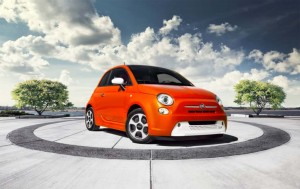Despite the seemingly entrenched opposition of its CEO, Chrysler suddenly appears ready to charge into the electric vehicle market.
With the new Fiat 500e now rolling into showrooms in California, the smallest of the Detroit makers has “additional vehicles coming,” hints Chrysler’s global battery car chief.
“The 500e is just the first step,” said Mike Duhaime, the maker’s new global director of electrified propulsion and engineering, in an interview with the Detroit Free Press. “There are battery-electric vehicles in our future.”
Chrysler is clearly playing a game of catch-up when it comes to battery power, the maker way behind most competitors, large and small, when it comes to plug-ins, pure battery-electric vehicles, or BEVs, and even conventional hybrids. One of the reasons has been the strong concerns about battery power repeatedly expressed by Fiat/Chrysler CEO Sergio Marchionne.
The Canadian-educated executive killed off several projects when Fiat took over Chrysler following the U.S. maker’s emergence from bankruptcy in 2009. He did approve the 500e, a well-received battery-car that some skeptics have dubbed a “compliance vehicle,” since it seems primarily aimed at meeting the minimum requirements established by California regulators for any major carmaker that wants to do business in that state.
Even then, Marchionne has repeatedly noted that he expects to lose about $10,000 on every Fiat 500e he sells because the maker can’t find buyers if it actually charges them what it would cost to make the battery-car.
Asked how his upbeat attitude towards battery power jibes with the more skeptical view of his CEO, electrification chief Duhaime said, “Sergio’s comments are Sergio’s comments, you have to talk to him. But from my point of view, the 500e is just the first step.”
Duhaime served as the chief engineer for the powertrain on the Chevrolet Volt extended-range electric vehicle before tendering his resignation a year ago after 33 years at General Motors. Industry insiders say Duhaime would not have jumped ship without getting a clear promise Fiat and Chrysler have significant plans in the works for battery-based vehicles. Development for such products – whichever brand they wear — has been centered at the Chrysler Technical Center in the Detroit suburb of Auburn Hills.
According to the latest monthly report from Hybridcars.com, Americans purchased 257,820 battery-based vehicles of one form or another during the first six months of this year, or roughly 4% of the overall U.S. market.
Sales have lagged expectations, particularly for more advanced battery vehicles, such as the Volt plug-in which missed its sales targets since its late 2010 launch. Several battery makers have either gone bust or are expected to do so soon, notably BEV-maker Coda and plug-in hybrid manufacturer Fisker Automotive.
But there have been some positive signs. Tesla Motors beat its own optimistic sales forecast for the first quarter by 10%, helping fuel its first-ever profit. And if anything, Nissan is currently struggling to meet demand for the Leaf battery-car.
(Tesla stock surges to record level then plunges as analysts take a hard, second look. Click Herefor more.)
Nissan’s big jump follows the start-up of a new, U.S. assembly line for the Leaf and the decision to slash prices on the battery car. A growing number of competitors have also taken price cuts on models such as the Volt, the Ford Focus EV and the Honda Fit EV.
(Nissan Leaf sales outstrip production. Click Here for that story.)
Even so, most observers expect demand for advanced battery vehicles to increase relatively slowly in the next few years. Several factors could help spur demand, however, including the addition of new product – much as is happening with a flood of new conventional hybrid offerings.
(For more on the next wave of hybrids, Click Here.)
Further price cuts are clearly welcome news for consumers, though it will likely take major breakthroughs in battery technology to bring vehicles more in line with comparable, gas-powered models.
But several makers, notably including BMW, are looking at not only cheaper but significantly more powerful batteries that would overcome another issue, range limitations.
(Chevy planning to export Spark EV. Click Here.)
Chrysler’s Duhaime suggested the maker is looking at a wide range of applications for battery power that will include less sophisticated yet mileage-boosting technologies such as Stop/Start. That allows a vehicle’s engine to shut off briefly at a stoplight, for example, then automatically restart when the driver’s foot lifts off the brake.
According to Duhaime, the maker is “looking throughout our whole portfolio” to find vehicles that could use the higher-mileage technology.


With a very small market and more players there are going to be wholesale financial losses for many. The smaller companies are likely to be the losers in the end.